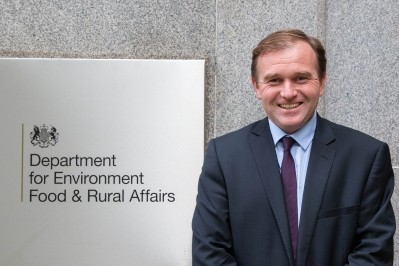Change in relationship needed: FSA boss

Catherine Brown, the Food Standards Agency’s (FSA’s) chief executive, is a great believer in ‘responsibility’. During the course our discussion, when I met her at the FSA’s headquarters in London last month, she used the term 23 times.
While she is clear about the FSA’s responsibility in protecting consumers by ensuring the UK food and drink industry meets its responsibility for delivering safe and legal products to them, she feels manufacturers and retailers are sometimes failing to step up to the plate when it comes to meeting some of their other responsibilities.
Whether it’s being more open and transparent in sharing intelligence with the FSA about potential illegal and unsafe practices, or in promoting the merits of modern food science – including the need to embrace genetic modification (GM) – to a sceptical public, Brown believes the industry should be doing a lot more.
But she is also clear the relationship between the FSA and food industry it regulates must change in light of the huge challenges the nation faces. The need to ensure the UK’s food security against a backdrop of rising global demand and ever tightening constraints on the FSA and local authority budgets, means that more of the same will no longer do, she says.
“There is a lot of downward pressure on production, so potentially reducing the amount of food unless good new production techniques are approved,” says Brown. “The implications of that are really significant for us and industry, because that's going to lead to massive pressures on the system.”
In particular, Brown believes a more holistic approach is needed in dealing with problems in the food supply chain rather than, as we have done in the past, dealing with them in a piecemeal way. “Until you start to look at that whole context: increasing risk; reducing food supply; increased complexity; less resource in government, you can’t start to put together a really coherent approach,” she says.
Strategy for 2015–2020 (Return to top)
The FSA has begun work on its new strategy for 2015–2020. Crucial to this strategy will be attempts to improve the way the industry and FSA collaborate with each other.
“We are going to be working on our strategy for the next six months or so, but it’s key that we get clarity on responsibility,” says Brown. “It is important that we find ways of helping each other to meet our obligations while being absolutely clear whose obligation is whose.”
She emphasises how the FSA already works with the food industry to help it grow and is not the dead hand of bureaucracy some suggest. With huge change in global food supply in prospect, closer working between the FSA and the UK’s food industry can be expected.
The FSA already supports exporters through export certification, particularly to emerging markets outside Europe, says Brown. It also works with the food industry to ensure that EU legislation is proportionate and protects consumers in ways that also protect the industry. One example she cites involved lobbying the European Commission on legislative changes covering smoke flavourings. “If we hadn’t made the evidence interventions that we made, you would have lost access to a number of flavourings that are important,” says Brown.
In another example, there was a threat that all farmed fish would have to be frozen before it could be made into products which were lightly cooked or uncooked. This would have hit Scottish fish farms very badly. “Very much, our work within Europe with industry put a stop to that happening.”
EU ban (Return to top)
And then there was another piece of work to prevent the EU ban on the food colouring Sunset Yellow, which would have adversely hit products such Lucozade and Irn Bru. “The iconic drink of Scotland could have been impossible to produce if the rules had gone through as they were originally drafted.”
Where Brown feels industry should be doing more is in extending its checks on ingredients further up the supply chain and in ensuring the controls it puts in place are fit for purpose.
She also wants industry to be more open in sharing intelligence with the FSA. “If businesses are really serious about the things Professor Elliott [who conducted last year’s inquiry into the horsemeat scandal] is saying, you might expect us to get a little bit more from them than we get from individual whistle blowers,” says Brown. “But at the moment I am hearing a lot about the problems of information sharing.”
If companies don’t have enough trust in the FSA to share information for fear of being penalised regarding, say, the sharing of private sector laboratory tests, which might throw up emerging food safety or fraud issues, Brown suggests the industry might want to operate through independent third-parties – with organisations such as Campden BRI or Leatherhead Food Research. “If you want to come up with some way of aggregating and anonymising some of this data, we would understand that. It would be useful to us,” says Brown.
Earned recognition (Return to top)
The FSA is currently evaluating the potential for using third-party food hygiene auditing schemes such as the British Retail Consortium (BRC) Global Standard and others, as a means of applying ‘earned recognition’ to allow its inspectors to focus more on higher risk premises.
“More fundamentally, as we think about the strategy for the future we have got to work out what constitutes robust assurance and what we would need,” she says. “I’ve always been very keen that if we are going to recognise standards, then we need to know about significant breaches when they arise. But I also would like to know about the amount of small breaches.”
While Brown reassures industry that the FSA would not act on minor non-compliances in third-party audits where they didn’t pose significant food safety risks, it would highlight potential “pressure points” in the food chain. “It’s like the principle of near misses in health and safety: if you start to see lots of problems in a particular area, even if they are small problems now, you want to know.”
She welcomes the improvements covering authenticity and bio-security that schemes such as BRC and Red Tractor respectively have implemented following deficiencies identified during last year’s horsemeat scandal. And she believes increasing use of unannounced audits also represent a logical development. However, she echoes continuing industry concerns about inconsistent audits and auditor competence.
Selling science (Return to top)
Returning to the issue of responsibility, Brown believes that consumers also have a duty; notably in recognising that if they want to continue safely enjoying a wide variety of different foods in a changing world, they will need to accept the use of science in putting food on their tables. But consumers can't be expected to do this on their own.
“This is an interesting area where industry, as well as we, have a critical role to play,” says Brown. “We will talk with consumers. One of the things we have been talking about as we think about our new strategy is, okay we are clear on the responsibility of industry. We are pretty clear on our responsibility to make sure that industry steps up and takes on their responsibilities. But there are responsibilities for consumers too and we've got a role in helping that.”
However, Brown is adamant that industry has to take the lead. She cites the carcinogen acrylamide – a chemical produced naturally in food by cooking starch-rich food at high temperatures, such as when baking or frying – as an example of what needs to be done.
“The industry has done a fantastic job of reducing the amount of acrylamide in snacks by more than 50% and I was really impressed by the level of investment and real cultural focus on reducing acrylamide,” she says. “That’s fantastic, but I understand that there is a GM potato in the States which, if used, would eliminate acrylamide from crisps.”
Brown calls on the food industry to explain clearly to consumers why they should embrace new scientific techniques, such as potatoes containing the GM enzyme asparaginase, which would reduce the risk of acrylamide in their food, since it is its duty to reduce risks from chemicals such as acrylamide to the lowest levels possible.
“It’s people shirking the need to have a conversation with consumers, which goes: ‘here are some risks, here’s all the great stuff we have done, and here’s something which all the science tells us is safe’.”
Expect the FSA’s new strategy for 2015–2020 to include a lot more about working in closer alignment with the UK food industry to secure its future. “Since our mission and purpose is to protect consumers' interests in relation to food which includes being able to get it it has made growth feel a much more core part of our strategy,” says Brown.
“But it has obviously got to be safe growth; growth of good, responsible businesses.”
Watch our video in which Brown shared her views on why the FSA is not best placed to take over a national policing role for food fraud.














